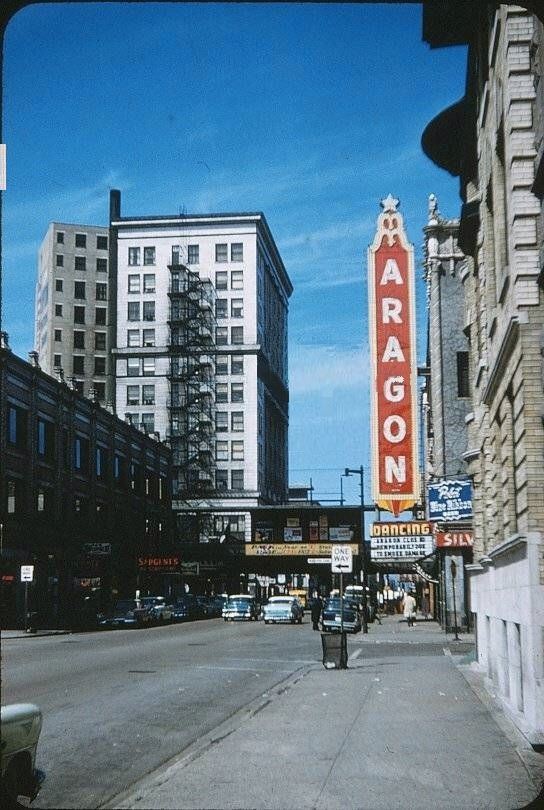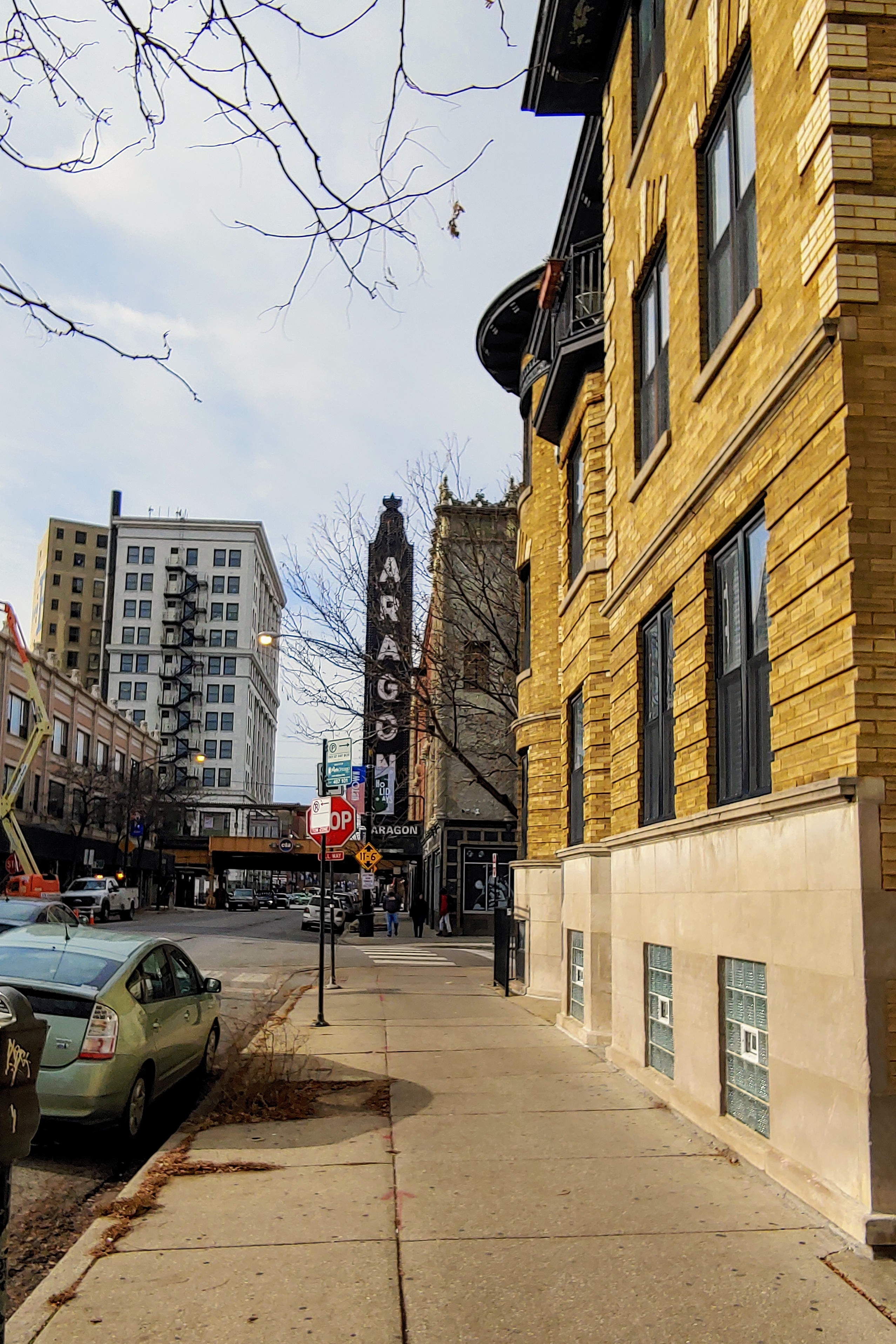I came across this photo of the Aragon Ballroom from 1956:

Here's the same location about half an hour ago:

I may have to re-shoot this with a longer lens and from farther back. It's interesting how little has changed though.
Uber, the ride-sharing company that pretends it isn't a ride-sharing company, has started a massive PR campaign against the city of Chicago because Mayor Lori Lightfoot wants them to pay for the damage they're causing to the commons.
Let's unpack all of that.
Lightfoot has proposed a $3 tax on ride-sharing trips into the Loop, Near North, Lincoln Park, and other affluent areas, and a smaller tax on trips out of the center city, because trips in and out of those areas cause several kinds of damage to the city's infrastructure. This is the definition of "negative externalities." In fact, Uber's and Lyft's pricing model has caused the following problems:
- A glut of cars on the road during rush hour, with all the emissions and traffic they cause;
- Reduced public-transit ridership and revenue, which disproportionately harms less-affluent users;
- The destruction of the regulated taxi industry in Chicago, including thousands of bankruptcies due to taxi medallions losing more than two-thirds their value since 2014; and
- The enrichment of Uber's officers and shareholders on the backs of underpaid Uber drivers.
Lightfoot's tax will increase the cost of a trip from Lincoln Park to Chicago by $3. If that pushes people to use public transit instead, we win. If people pay the tax, we win. If Uber's board take home less money, that's a neutral result we can all cheer anyway.
Compared with the way London, for example, has dealt with the environmental damage of cars in the central city, Uber's getting off easy in Chicago.
But of course, having gotten very rich through exploitation of other people, they don't see i that way. (Why are billionaires so whiny these days? Even Carnegie built libraries.)
Because we don't have Satanic mills employing thousands of 9-year-old orphans any more, it's hard to see the direct similarities between companies like Uber and companies like those portrayed in Dickens novels. But guess what? They're fundamentally the same. And Lightfoot's tax is only the first, modest step in Chicago government making life better for everyone in the city in the aggregate. The people complaining the most about the Uber tax are the people to whom $3 hardly matters. You can tell because $3 is more than the price of a CTA ride, and less than the current cost of an Uber ride.
If some Uber shareholders have to suffer a little so that people on the South and West Sides can get to work more reliably, I'm OK with that.
Today's crop of articles:
And now, back to coding.
Chicago has the world's 6th busiest airport, with hundreds of thousands of aviation operations every year. Naturally the people who live nearby get an earful. I live about 16 km east of the approach end of runway 28C, the preferred landing runway from destinations south and west of Chicago. Even though the planes are about 4,000 feet up when they cross the lakefront, I can still hear them well enough to tell them apart by sound. (No machine in the world sounds like a 747, I assure you.)
Starting today, the airport will use a rotating arrangement of landing and departing runways for nighttime operations (10pm to 7am). Despite its name, the "interim fly quiet" plan won't actually reduce aggregate noise emissions. It'll just spread them around more evenly:
Currently, O’Hare uses just the parallel, east-west runways at night. The so-called “Interim Fly Quiet” plan will mix in diagonal runways, so an east-west runway will be used one week, then a diagonal runway the next, then back to east-west, with adjustments made depending on weather and other factors.
It will mean more noise for suburbs like Des Plaines, to the northwest of the airport, while areas more directly east or west, such as Bensenville and some North Side Chicago neighborhoods, will get less.
Note that this only applies to nighttime operations, when planes land about every 10 minutes. During peak hours, O'Hare brings them in on two parallel runways at 90-second intervals. When runway 9C/27C opens soon, it will be possible for O'Hare to land one plane a minute on 3 parallel runways.
The Atlantic's Alexis Madrigal points out that while PG&E has some responsibility for California's wildfires, the real culprits are the voters and elected officials who have ignored routine maintenance for two generations:
A kind of toxic debt is embedded in much of the infrastructure that America built during the 20th century. For decades, corporate executives, as well as city, county, state, and federal officials, not to mention voters, have decided against doing the routine maintenance and deeper upgrades to ensure that electrical systems, roads, bridges, dams, and other infrastructure can function properly under a range of conditions. Kicking the can down the road like this is often seen as the profit-maximizing or politically expedient option. But it’s really borrowing against the future, without putting that debt on the books.
In software development, engineers have long noted that taking the easy way out of coding problems builds up what they call “technical debt,” as the tech journalist Quinn Norton has written.
Like other kinds of debt, this debt compounds if you don’t deal with it, and it can distort the true cost of decisions. If you ignore it, the status quo looks cheaper than it is. At least until the off-the-books debt comes to light.
In the same vein—or, perhaps, in a root-cause analysis—Vox recently interviewed author Bruce Gibney about his 2017 book A Generation of Sociopaths: How the Baby Boomers Betrayed America:
[T]he damage done to the social fabric is pretty self-evident. Just look around and notice what’s been done. On the economic front, the damage is equally obvious, and it trickles down to all sorts of other social phenomena. I don’t want to get bogged down in an ocean of numbers and data here (that’s in the book), but think of it this way: I’m 41, and when I was born, the gross debt-to-GDP ratio was about 35 percent. It’s roughly 103 percent now — and it keeps rising.
The boomers inherited a rich, dynamic country and have gradually bankrupted it. They habitually cut their own taxes and borrow money without any concern for future burdens. They’ve spent virtually all our money and assets on themselves and in the process have left a financial disaster for their children.
We used to have the finest infrastructure in the world. The American Society of Civil Engineers thinks there’s something like a $4 trillion deficit in infrastructure in deferred maintenance. It’s crumbling, and the boomers have allowed it to crumble. Our public education system has steadily degraded as well, forcing middle-class students to bury themselves in debt in order to get a college education.
Then of course there’s the issue of climate change, which they’ve done almost nothing to solve. But even if we want to be market-oriented about this, we can think of the climate as an asset, which has degraded over time thanks to the inaction and cowardice of the boomer generation. Now they didn’t start burning fossil fuels, but by the 1990s the science was undeniable. And what did they do? Nothing.
There's a reason the latest meme sweeping Gen Z is "ok, boomer."
First, former New York mayor Rudy Giuliani, who appears entirely too deeply integrated in the President's impeachable offenses to get out without an indictment, and who also owns what he calls a "security consulting service," butt-dialed an NBC reporter. Twice. And the resulting voicemails were...interesting.
Second, how exactly did Justice Brett Kavanaugh pay for his house in 2006? He seems to have gotten almost $250,000 from some undisclosed source.
Finally, the City of Chicago will raise taxes on ride-shares because they cost the city a lot of money. A new report shows that Uber and Lyft have significantly raised traffic levels and delayed buses since their arrival in 2014.
Happy Friday!
While my work computer chews through slightly more than a million calculations in a unit test (which I don't run in CI, in case you (a) were wondering and (b) know what that means), I have a moment to catch up:
- Boris Johnson has asked MPs to dissolve Parliament on Monday, which, if 2/3 of Commons agrees, means there would be an election on December 12th. The EU will vote tomorrow on whether to accept the UK's Brexit extension request, which is the Labour Party's condition for agreeing to new elections.
- Education Secretary Betsy DeVos, in a good position to win the award for Worst Cabinet Secretary of 2019, may end up costing President Trump re-election (beyond what he's doing to ensure a Democratic victory). It turns out people in Michigan do not want their tax money to go to private education companies like hers. The cherry on top of that is she might actually go to jail in the next few days.
- Josh Marshall argues that the goal of the interrupted-by-being-arrested-at-the-airport plan of Rudy Giuliani's friends might have been simply to get Ukrainian president Volodymyr Zelensky to go on TV and say Ukraine was opening an investigation into Hunter Biden. Just having a head of state say that could tank the Biden nomination on its own, even if everyone knows there really is nothing to see.
- A group of 30 Republican House members burst into a Sensitive Compartmented Information Facility (SCIF) in the Capitol building yesterday to hold up the testimony of Deputy Assistant Defense Secretary Laura Cooper. Ordinarily, if you violate a SCIF, the intelligence services quickly remove your security clearance. I wonder if that'll be the case here.
- With Lake Michigan water levels consistently over 100 cm above average this year, the city will need billions of dollars to prevent and correct significant erosion of the shoreline.
- Finally, scientists have taught rats how to drive little cars. Seriously. It's adorable.
The first 30-minute calculation is done, and now I'm on to the second one. Then I can resume writing software instead of testing it.
Here are the news stories that filtered through today:
See? You thought more of the news would be bad.
Not too much:
And two algorithms I'm testing that should produce similar results are not. So back to the coding window I go.
My task this afternoon is to parse a pile of random text that has, shall we say, inconsistencies. Before I return to that task, I'm setting aside some stuff to read later on:
And finally, Crain's reviews five relatively-new steakhouses in Chicago. Since we probably won't eat steak past about 2030, these may be worth checking out sooner rather than later.